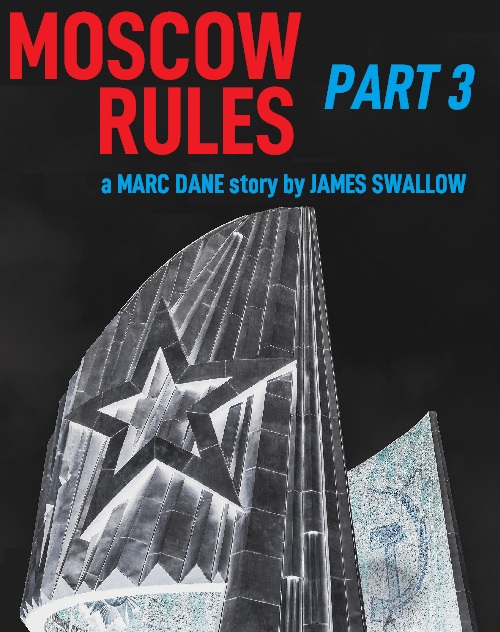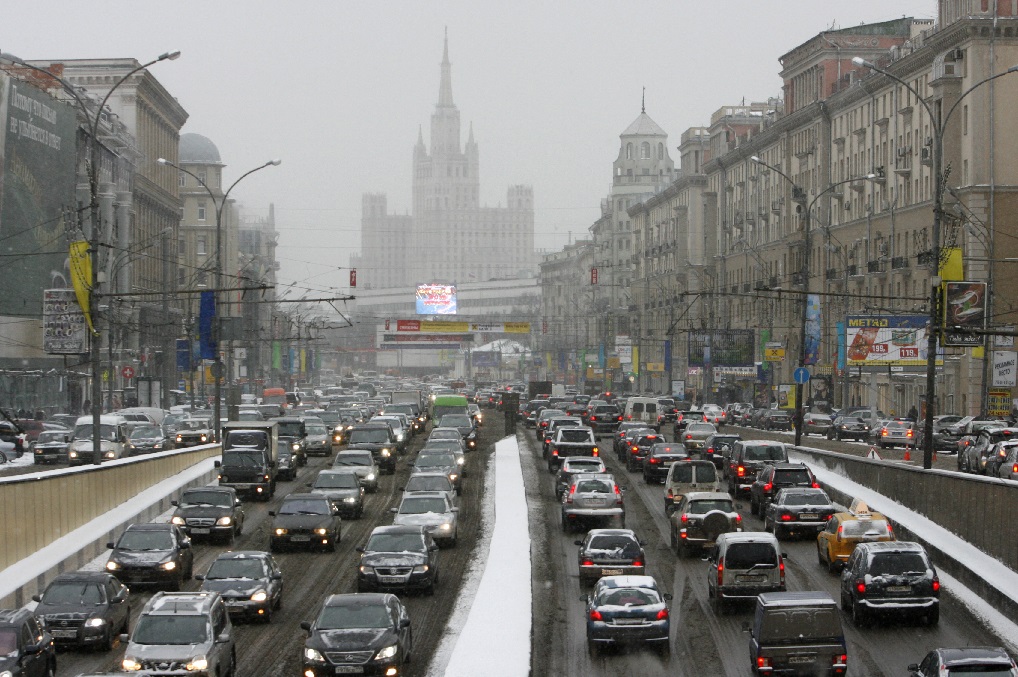Continuing MOSCOW RULES, a brand-new Marc Dane serial novella…

On a mission to fulfil a request for his employer on the streets of Moscow, Marc Dane finds himself dragged into a deadly scavenger hunt for a prize that could cause chaos in the wrong hands…
In Part 2, after receiving a mysterious key from the widow of notorious KGB spymaster Sergei Morozov, Marc discovered a hidden compartment in a decrepit safehouse and fought off a pair of brutal mercenaries intent on taking what he found within. But as he escaped, Marc realized he may be in more trouble than he knows…
Read on for Part 3 of MOSCOW RULES; future chapters will be released via this blog, but if you’d like to get early access, sign up to the James Swallow Reader’s Club at this link or type your email address in the box at the bottom of this page.
MOSCOW RULES part 3 – EVERYONE IS POTENTIALLY UNDER OPPOSITION CONTROL
The cab – a world-weary Skoda Octavia in grimy canary yellow – continued to pick up speed, racing away from the destination Marc had requested. The driver didn’t seem to notice he had a passenger in the back, and after calling out to him, the Englishman’s jaw set in annoyance and he planted a knee in the back of the man’s seat, raising his voice. Muscovites had a tendency to treat any foreigners like they were idiots, and Marc had no time for it.
“Hey!” He leaned forward. “Where the hell are we going? You listening to me, mate? I said Komsomolskaya Square, not the scenic route-”

As they reached an intersection the cabbie stood abruptly on the brakes, with enough force that Marc was reeled back hard by his seatbelt, his breath gushing out of him in a whoosh. He saw a black Mercedes rolling to a halt alongside the taxi, clocking the tinted windows and the way it lay low on its shocks – a telltale sign it carried the additional weight of bullet-proofing.
So this wasn’t the everyday fleecing of some hapless tourist. This was an entirely different game. Regretting his decision to ditch the guns he’d taken from the thugs in Morozov’s safehouse, Marc disengaged the seatbelt and pulled on the nearest door handle, but it resolutely refused to open.
The cab driver sat rigidly like an automaton, staring directly forward out of the windscreen as two men got out of the Merc and climbed into the taxi. One, hatchet-faced and heavy in a grey field jacket and matching Cossack hat, lumbered his bulk into the passenger seat in front of Marc, glaring at him as if he was responsible for doing the guy some great misdeed. The second man was older and slower about things, a patrician type wearing a greatcoat that pooled around him as he slipped into the back next to Marc. He settled, gave a nod, and the cab took off again like a rocket, veering into the busy flow of Moscow’s rush hour traffic.
Marc had an inkling about the man in the greatcoat, and played it. “You were at the funeral.” He spoke in English, waiting to see what came back from the bait he cast, but the older man seemed to be in no hurry to reply.
The cab barrelled along at an unpleasantly swift pace, the driver threading it through gaps between lorries and across intersections against the lights, apparently to the complete disinterest of local cops loitering by the slip-roads. The silence inside the car lengthened, and Marc dredged up his mental map of the city.
Where are we going? He found himself wondering if their destination would be some dingy unmarked building in the middle of nowhere, a place where the sound of the pistol shot that killed him might go unremarked. Another statistic, a luckless British tourist who had a misadventure in a city he didn’t know. Was that how this was going to play out? Marc’s grip tightened on the string bag holding the vodka bottle Sergei Morozov had bequeathed to his boss.
The traffic around them evened out as the cab joined vehicles on the MKAD ring road that circled Moscow’s outer perimeter, and the ride became smoother, the windscreen wipers swishing back and forth to bat away the sleety snowfall; then without preamble, the man in the great coat shifted in his seat so he could look Marc up and down.
“Marcus Dahl,” he said, quoting the name on Marc’s expensively-forged Norwegian passport, and the way he did so made it clear he knew the identity was a cover. “We have not met. I am Melor Rykov.” He nodded toward the big guy in the front. “This is my associate, Gurik.” Marc thought about playing dumb, but before he could frame a reply, Rykov continued on. “Does my name spark any recollection with you?”
It did. In the files of MI6, Melor Rykov was a known player, codenamed METRIC by Western intelligence services, a highly-placed officer in Russia’s FSB – the agency that had grown out of the corpse of that rightly-feared Cold War enemy, the KGB. Rykov rated a few mentions in the redacted brief document Marc had read on Sergei Morozov – years before Morozov had been quietly encouraged to quit the espionage life and retire, Rykov was the deceased spymaster’s protégé.
Which means I need to tread carefully, Marc thought. “What is this about?” he asked, glancing at the driver, who was still studiously ignoring them.
“Don’t concern yourself with him, he’s deaf,” Rykov said airily.
“Oh.” That detail didn’t do anything to calm Marc’s racing pulse.
“The flowers you left were very beautiful. A fine gesture,” said Rykov, with a genuine nod. “Sergei always spoke of your employer with great admiration.”
“The feeling was mutual.” Marc decided to play things straight, at least for the moment, and chanced another conversational lure. “I understand his passing was…quick.”
“A small mercy.” Rykov grimaced, then gave Marc another look. “Sergei had many enemies. If you represented one of them, we would not be having this conversation.” He left the implied threat where it lay. “Some believe my old mentor was murdered, of course.” Rykov said it matter-of-factly. “Perhaps you know why.”
Marc shook his head. “You’re mistaken. I was just here to deliver the flowers. Pay some respects.”
“Is that why you were at the apartment in Golovinsky District?” Gurik spoke for the first time, his thick accent crushing the vowels of his English. “What did you steal from there?”
“I could ask you the same question,” Marc shot back. “Your blokes tossed it looking for something, yeah?”
“Those were not our men,” Rykov noted. He let out a long, low sigh, glancing out of the window as the city sped past them. “It is not like the old days. Resources have grown thin, you understand? So many men are raking off their take before our funding gets to the field. For every bullet I have, two have been stolen to sell on the black market.” He shook his head. “Once upon a time, I could have rolled you into the basement of the Lubyanka and put you to the question. Learned everything you know, da? But these days, I am reduced to driving in circles around the ring road with those I wish to converse with. Too many ears elsewhere.”
Marc suppressed a shiver. The Lubyanka was the KGB’s notorious headquarters down on the former Dzerzhinsky Square, where countless numbers of spies, dissidents and others who earned the ire of the Russian State had been ‘disappeared’.
“Tell me what you know about the ledger, Mr. Dane.” Rykov didn’t look back at him as he spoke.
So much for Marcus Dahl, then, thought Marc. “I don’t know anything about any ledger,” he said, and it was the truth. “If it’s something to do with Morozov or those merc dickheads who shot at me, it’s not my business.”
Gurik gave a gruff snort of amusement. “Not your business,” he echoed testily. “How often have you and Ekko Solomon’s band of vigilantes interfered in Russian affairs? What gives you that right, eh? We keep our own house in order!”
“My comrade’s point is well made,” said the older man. “It was you who killed Pytor Glovkonin, was it not?” Rykov’s gaze settled on Marc and bored into him.
For years, working alongside Ekko Solomon, Lucy Keyes, Assim Kader and the rest of his team, Marc Dane had dedicated himself to finding and destroying the clandestine power-brokers known as the Combine – the money-men behind dozens of terrorist atrocities and staged disasters, an amoral group who saw chaos as a means to make profit. Pytor Glovkonin had been one of those men. The worst of them.
It had cost a lot, including the lives of too many good friends along the way, but in the end Marc and the others ended it. They burned the Combine’s secret network to the ground, and Glovkonin along with it.
Marc remembered the sound of a rifle discharging, and the round he’d put into Glovkonin’s thigh after the billionaire oligarch had tried to murder Marc and his friends. He thought about everything Glovkonin had taken from him, every vicious plot and act of destruction the man had funded, and what that venial, amoral bastard would have done if he had succeeded in his schemes. Marc didn’t feel one iota of guilt about pulling that trigger, and Rykov saw it in his eyes.
“I didn’t kill him,” Marc clarified. “His greed did. That and the blood loss.”
“A vile and soulless man,” noted Rykov. “The world is better off without Glovkonin and his co-conspirators. But it was not your place to deal with him. He was Russian. He was our responsibility.”
“He was Combine,” said Marc, pressing the point. “And those men were only loyal to money.”
“Before you embarked on your great crusade,” sneered Gurik, “did you stop to think what your blundering would leave in its wake? The Combine held the leashes of dozens of hostile actors… Renegade military contractors, terrorists and criminal groups! Without their control, those factions are more dangerous than they have ever been. You turned one enemy into one hundred.”
Marc couldn’t deny there was some truth to that, but he refused to accept that the alternative would have been any better. “The Combine let thousands of innocent people die – Russian citizens included – just to make their stock price rise a few percent. They got what they deserved.” He shot a look back at Rykov. “Is that what this is really about?”
“The past is a distraction.” Rykov shook his head. “My focus is the present. The ledger,” he repeated. “You must know the story.”
“I really don’t,” said Marc. He was starting to lose patience. “How about you stop treating me like a fucking chump and just come out with it, yeah? Save us all some time?”
Rykov grimaced at Marc’s profanity. “What has happened to English politeness?”
“All that public school shit went out with the Cambridge Five,” Marc snapped. “I prefer directness.”
Rykov sighed again. “Sergei Morozov was elderly when he died, in a game where spies rarely live long enough to see their pension. My mentor survived because his enemies and allies alike were afraid of him. Afraid of what he knew about them.”
“Kompromat,” growled Gurik. “You understand this word?”
“Blackmail files,” said Marc, with a nod. “A KGB classic. Gather compromising intelligence on a target of interest, then use that to gain leverage over them.”
“Paupers and princes, politicians and presidents… Russia has always known the value of their secrets. And Sergei knew where the bodies are buried.” Rykov chuckled dryly at his own comment. “To be clear, I am not using a euphemism when I say this.”
Marc fit the pieces together. “Your old boss had dirt on everyone, that’s what kept him alive. But as long as no-one touched him, he let it lie.”
“But then the old fool died. Unexpectedly.” Gurik chewed his lip. “We were not prepared.”
“You don’t know where it is.” Marc studied Rykov carefully, as the understanding came to him. “Bloody hell. No wonder you’re nervous. Whoever has that kompromat could name their price… Or ruin a lot of lives.”
Rykov spread his hands. “You see now the seriousness of the situation. So I ask again, what do you know? What did Galina give you?”
“A key for the safehouse.” There was little point in hiding that any more. Marc held up the string bag. “Morozov left a parting gift for my boss-”
He barely got the words out before Gurik lunged at him and ripped the bag from Marc’s hands. The big man gave the vodka bottle a shake, and over Marc’s protestations, he wound down the taxi’s window and emptied the bottle’s contents out on to the slush-caked highway racing past them.
Rykov gave a sniff. “Our technicians will examine the cap and the labels. Sergei was fond of, shall we say, classical tradecraft techniques? Microdots and the like.”
Marc sighed, and the cab gave a sudden lurch as it left the ring road for city streets again. “What a waste. I thought Russians appreciated good vodka.”
“Buy another bottle at the train station,” Gurik said briskly, as the taxi crossed on to the avenue where Marc’s hotel was situated. “Pack your bag and check out, Englishman.” Then he grew an unpleasant smirk. “As you said before, this is not your business.”
When the cab halted, Marc found his door was working once again, and he climbed out, back into the snow and the cold. Rykov peered up at him, favouring him with a wan smile. “I think, Mr. Dane, for the good of all, it would be best if you and I did not meet again. Da svidania.”
The taxi took off from the kerb at a rate of knots, splashing slush, and Marc watched the yellow Skoda disappear into the haze. With evening drawing in, the temperature was dropping fast, but the chill around him wasn’t just from the snow. Moscow wanted him gone, he could feel it like he was a splinter in the city’s skin.
As he walked toward the hotel’s reception, Marc’s gloved hand found an object still in his pocket, the cardboard gift tag that had been around the neck of the vodka bottle. He brought it out, pulling off one glove to run a finger over the writing on the card. Drink some for me.
There was something off about the tag. It felt oily to the touch.
Sergei Morozov was fond of classical tradecraft techniques. Rykov’s comment echoed in his mind.
“I should go.” Marc spoke aloud, the thought escaping in a puff of exhaled breath. But the more he considered it, the more he realized he wasn’t ready to leave just yet. The story of the dead man’s ledger, like it or not, had put a hook in him.
And if anything, being shot at and briefly kidnapped sharpened his resolve. Anyone who expected anything different of Marc Dane didn’t know him at all.


